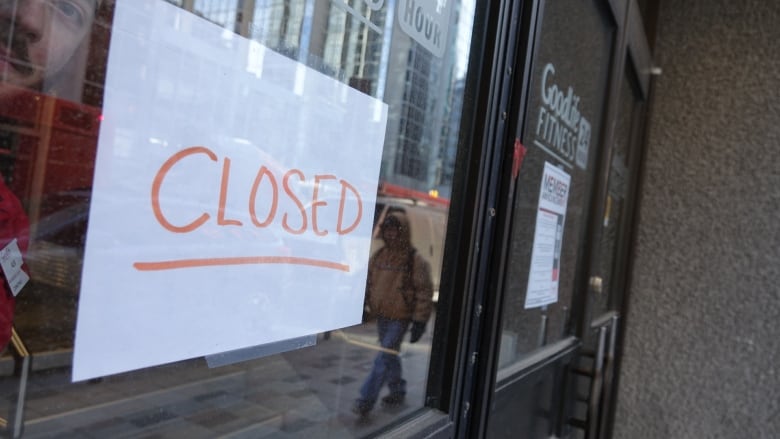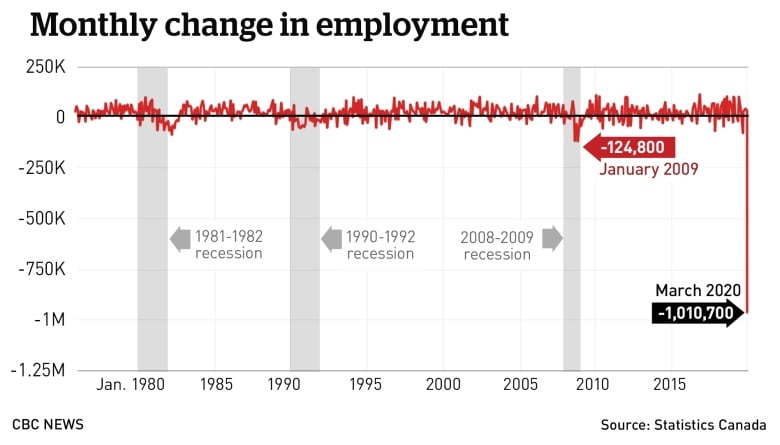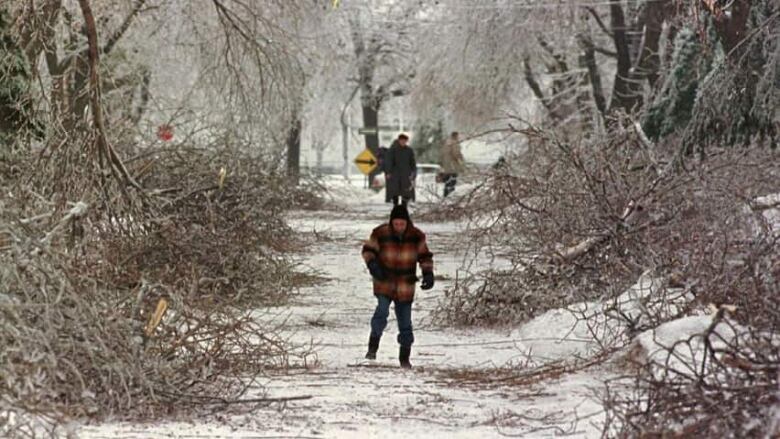Canada lost more than 1 million jobs last month as COVID-19 struck
Economists had been expecting about half a million jobs to be lost

Canada's economy lost more than onemillionjobs in March, Statistics Canada said Thursday, pushing the jobless rate up to 7.8 per cent.
Economists had been expecting the figure to come inat around 500,000 jobs lost, whichalready would have been the worst month for job losseson record.
Every month, the data agency surveys Canadians over the course of a single week to come up with its employment number for the month.
March's data is culled from surveys in the week that started March 15 a tumultuous week for Canadian society, as within seven days, Canadians went from packing forMarch break vacations to sheltering in place asbusinesses across the country locked themselves down to try to contain the spread of COVID-19.
According to Statistics Canada, 19.2 million Canadians had paid work in February before the coronavirus hit Canada with full force. A month later, barely 18 millionstill had jobs.
Watch:'This will be the new normal until a vaccine is developed,' saysTrudeau:
The real picture couldbe evenworse
The true employment picture is likely even worse. The data agency notes that on top of the one million people who became officially unemployed during the month, another 1.3million Canadians worked no paid hours because of lockdowns buttechnically still considered themselves to have jobs.
Another 800,000 Canadiansworked less than half of their usual workload.
And a further 219,000 people had a job in early March but were deemed to be no longer in the labour force by the time the survey week came around.
"They were not counted as unemployed because they did not look for a job," Statistics Canada said, "presumably because of ongoing business shutdowns and the requirement to socially isolate."

If those people were considered to be unemployed, Canada's official jobless rate would have been 8.9 per cent for the month. As it stands, the official jobless rate spiked by 2.2 percentage points to 7.8 per cent.That's the biggest monthly increase in the jobless rate in records that date back to 1976.
Statistics Canada says the closest comparable dramaticdecline in economic activity and employment the country saw last month was likely the 1998 ice storm that saw businesses in Ontario and Quebec suddenly close up shop.
The ice storm caused 166,000 people in Canada to temporarily lose all or most of their paid work. Last month's number was eight times higher than that.
Prior to Thursday's numbers, the worst month ever for Canadian jobs lost was January 2009, when the economy lost 124,400 jobs. March 2020's numbers obliterated that figure.

The biggest chunk of job losses came in the accommodation and food services sector, which shrank by almost one-quarter. The next hardest hit sector was IT, arts and culture, which lost 13 per cent of its jobs. Education took a nine per cent hit, while wholesale and retail trade lost seven per cent.
Just about every sector lost jobs, exceptnatural resources and agriculture, which added nearly7,000 jobs as activity ramped up to keep Canada's food supply chain robust.
Jobs in restaurants, hotels and retail made up about half of all the joblosses, and jobs that were lower paying to begin with were more likely to get cut during the month.
Almost half the jobs lost were positions that paid less than two-thirds of what the average worker gets paid, as 496,000 people the data agency considers to be low-wage workers lost all or most of their paid work during the month.
"The first workers to experience job losses as a result of COVID-19are among those least able to withstand economic hardship,"Statistics Canada said.
Young people and women were also disproportionately affected, with people between the ages of 15 and 24 losing392,500 jobs during the month, and women in their core working years, between 25 and 54, losing298,500 jobs.
The ice storm analogy may be an apt one, as economists get their first glimpse at the chill that has settled over Canada's economy in recent weeks.
"Today's numbers are just a first snapshot of the deep-freeze that's hit the Canadian labour market," said Brendon Bernard, an economist with online job marketplace Indeed.
- Coronavirus: What's happening in Canada and around the world today
- We're answering your questions about the Coronavirus. Go here to read the latest
"After a month of social distancing, a colossal drop in Canadian employment comes as no surprise, but its steepness is still shocking."
Every province lost jobs, but two-thirds of the damage came in Ontario and Quebec, which lost 403,000 and 264,000 jobs respectively.
The stunning job losses mean that 40 months' worth of jobs gains were wiped out in one fell swoop, and "the decline may unfortunately be even larger in next month's report," Bank of Montreal economist Doug Porter said.
If there is a shred of positivity in the numbers, it may be that most of the job losses could be temporary, as Statistics Canada observed that "workers expected to return to their job within six months."
"As shocking as these numbers are, the big issue is how long do the shutdowns last, and thus how persistent is this spike in joblessness," Porter noted. "That is still very much open for debate."













_(720p).jpg)


 OFFICIAL HD MUSIC VIDEO.jpg)
.jpg)



























































































